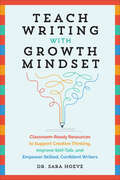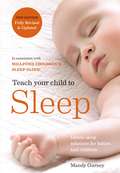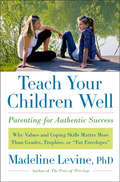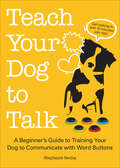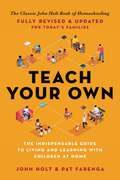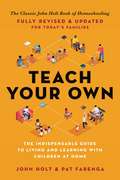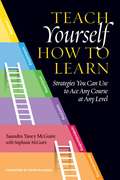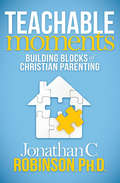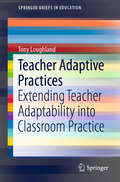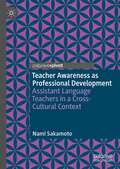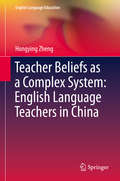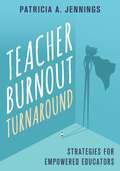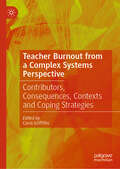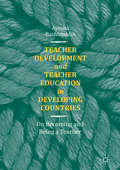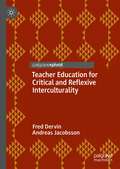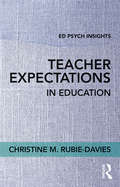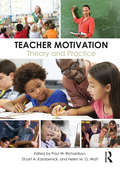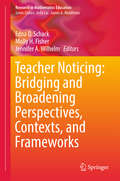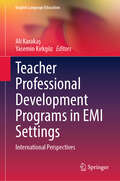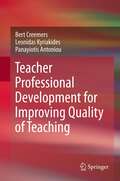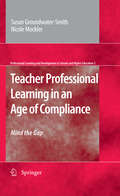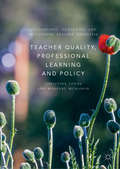- Table View
- List View
Teach Writing with Growth Mindset: Classroom-Ready Resources to Support Creative Thinking, Improve Self-Talk, and Empower Skilled, Confident Writers (Teach Writing With Growth Mindset Ser.)
by Sara Joy HoeveSet students up for a lifetime of writing success with activities and strategies for supercharging creativity, supporting engagement, and boosting confidence in an easy-to-use resource made just for busy teachers. Created for busy classroom teachers, this resource provides classroom strategies and writing activities you can immediately adapt and integrate into any classroom routine. Following a foreword by bestselling author of The Growth Mindset Coach Annie Brock, each chapter provides new tips and tricks to transform the culture of a writing classroom and convince students to finally let go of the “bad writer” label! Inside you’ll find: Writing exercises to build confidence and skill Teaching tips for inspiring successful young writers Lesson plans for integrating the growth mindset into your classroom And much more! This resource provides teachers with both the research-based pedagogy and the specific growth mindset strategies to foster positive writing identities in students of all ages. Let Teach Writing with Growth Mindset inspire you to make positive change in your students!
Teach Your Child to Sleep: Gentle sleep solutions for babies and children
by Mandy Gurney Millpond Children's Sleep Clinic"This book is a complete godsend for tired parents and children alike." - Melissa Hood, founder of The Parent Practice"This baby and child sleep guide is the perfect combination of accessible science, Mandy's years of experience and a mother's warmth." - Diana Hill, co-founder of Essential Parent "When feeling overwhelmed by tiredness and in need of real sleep help, Millpond's new edition of Teach Your Child to Sleep is a much welcomed, well researched resource." - Rozanne Hay, International Association of Child Sleep Consultants Millpond Children's Sleep Clinic has a 97 per cent success rate in resolving children's sleep problems. Discover how to get your baby or child to settle easily and sleep well with step-by-step advice that gets right to the heart of the issue. See results in 2-3 weeks Adapt methods to your child's needs A wide range of situations covered Gentle techniques that ensure lasting successThis edition of Teach Your Child to Sleep has been fully revised to reflect current practice in parenting and sleep solutions, with a new design and more than half of the photography refreshed.
Teach Your Child to Sleep: Gentle sleep solutions for babies and children
by Mandy Gurney Millpond Children's Sleep Clinic"This book is a complete godsend for tired parents and children alike." - Melissa Hood, founder of The Parent Practice"This baby and child sleep guide is the perfect combination of accessible science, Mandy's years of experience and a mother's warmth." - Diana Hill, co-founder of Essential Parent "When feeling overwhelmed by tiredness and in need of real sleep help, Millpond's new edition of Teach Your Child to Sleep is a much welcomed, well researched resource." - Rozanne Hay, International Association of Child Sleep Consultants Millpond Children's Sleep Clinic has a 97 per cent success rate in resolving children's sleep problems. Discover how to get your baby or child to settle easily and sleep well with step-by-step advice that gets right to the heart of the issue. See results in 2-3 weeks Adapt methods to your child's needs A wide range of situations covered Gentle techniques that ensure lasting successThis edition of Teach Your Child to Sleep has been fully revised to reflect current practice in parenting and sleep solutions, with a new design and more than half of the photography refreshed.
Teach Your Children Well
by Madeline LevinePsychologist Madeline Levine, author of the New York Times bestseller The Price of Privilege, brings together cutting-edge research and thirty years of clinical experience to explode once and for all the myth that good grades, high test scores, and college acceptances should define the parenting endgame. Teach Your Children Well is a toolbox for parents, providing information, relevant research and a series of exercises to help parents clarify a definition of success that is in line with their own values as well as their children’s interests and abilities. Teach Your Children Well is a must-read for parents, educators, and therapists looking for tangible tools to help kids thrive in today’s high-stakes, competitive culture.
Teach Your Dog to Talk: A Beginner's Guide to Training Your Dog to Communicate with Word Buttons
by Stephanie RochaTrain your dog to communicate through more than just barks—the first beginner&’s guide to pet training with speech buttons and soundboards!Teach Your Dog to Talk is an easy-to-use guide to exploring Augmentative and Alternative Communication (AAC). Inspired by the discovery that dogs can use AAC to communicate with their humans, this book is perfect for pet owners looking to foster a deeper connection with their dog through &“speech training.&” Explore this fun (and funny!) endeavor as you learn the basic setup of currently available AAC devices and best practices for getting started, and enjoy notable achievements by some of the internet&’s favorite &“talking&” dogs. The book also answers frequently asked questions, discusses common mistakes, and offers do's and don&’ts. Create a whole new bond with your beloved four-legged friend with the tips and tricks offered in this first-of-its-kind handbook.
Teach Your Own: The Indispensable Guide to Living and Learning with Children at Home
by John Holt Pat FarengaThe classic guide to teaching children at home for a new generation of homeschooling parents In 2019, there were more than two million children being homeschooled. That number doubled during the pandemic and is now likely to continue increasing as more parents worry that school might not be the best place for their children to learn and grow. Teach Your Own helped launch the homeschooling movement; now, its timeless and revolutionary message of recognizing the ways children come to understand the world has been updated for today&’s environment. Parents and caregivers will discover how to navigate: Learning in a classroom versus learning in the worldThe difference between a learning difficulty (which we all experience every time we try to learn anything) and a learning disability.Schedules that achieve the homeschooling-work-life balance that you want as a familyThe relationship between learning and playHomeschooling and technologyAnd much more. John Holt's warm understanding of children and his passionate belief in every child's ability to learn have made this book an essential resource for over forty years to homeschooling families.
Teach Your Own: The John Holt Book of Homeschooling
by John Holt Patrick FarengaFarenga is president of Holt Associates, originally founded by John Holt (1923-1985). This text incorporates portions of Holt's 1981 text, , and sections from Farenga's 2000 text, , along with new information reflecting today's laws, lifestyles, and a new generation of homeschooling parents. In addition to providing practical information on how and why to homeschool, the text addresses the political, legal, and legislative issues homeschoolers faced in the early 1980s, and are likely to face now and in the future. Annotation (c)2003 Book News, Inc. , Portland, OR (booknews. com)
Teach Yourself Emotional Intelligence
by Christine WildingUnderstanding emotional intelligence and applying it to your life.
Teach Yourself How to Learn: Strategies You Can Use to Ace Any Course at Any Level
by Saundra Yancy McGuire Stephanie McGuire Mark McDaniel<p>Following up on her acclaimed Teach Students How to Learn, that describes teaching strategies to facilitate dramatic improvements in student learning and success, Saundra McGuire here presents these "secrets" direct to students. <p>Her message is that "Any student can use simple, straightforward strategies to start making A's in their courses and enjoy a lifetime of deep, effective learning." <p>Beginning with explaining how expectations about learning, and the study efforts required, differ between college and secondary school, the author introduces her readers, through the concept of metacognition, to the importance and powerful consequences of understanding themselves as learners. This framework and the recommended strategies that support it are useful for anyone moving on to a more advanced stage of education, so this book also has an intended audience of students preparing to go to high school, graduate school, or professional school. <p>In a conversational tone, and liberally illustrated by anecdotes of past students, the author combines introducing readers to concepts like Bloom's Taxonomy (to illuminate the difference between studying and learning), fixed and growth mindsets, as well as to what brain science has to tell us about rest, nutrition and exercise, together with such highly specific learning strategies as how to read a textbook, manage their time and take tests. <p>With engaging exercises and thought-provoking reflections, this book is an ideal motivational and practical text for study skills and first year experience courses.</p>
Teach Yourself Jung
by Ruth SnowdenCarl Jung (1875-1961) was a Swiss psychologist and psychiatrist who is famous for founding a new system of psychology that he called 'analytical psychology'. Jung has gradually acquired a huge following and many therapists today are trained in the Jungian method. However, his work also contains many important insights into the lives of humankind, far beyond the field of therapy, that have only recently begun to be more widely understood. He was one of the first great thinkers to try and bridge gaps between the thinking of East and West, Christian and pagan. He demonstrated ways in which Western culture, so bound up in science and logic, was often sadly deficient in the spiritual awareness and subjective insight shown in other cultures and at other times in history. This book provides a general introduction to both Jung and his work, and the section at the end, Taking it further, suggests ways in which you can continue your study of this fascinating and great thinker.
Teachable Moments: Building Blocks of Christian Parenting
by Jonathan RobinsonCommunication strategies for building a better relationship with your children, from a psychologist who has worked with families for over three decades. Are you frustrated when your child is not responsive to your efforts to be a good parent? Are you shaking your head in confusion or barking orders as a last resort in getting through to him/her? Do you wish for more quality time with your child? Parenting is the toughest job—for which most parents have no training. We tend to emulate our own parents, for good or for bad. In the Bible, Proverbs 22:6, we are told to &“train your children in the ways of the Lord, so that when they are old, they will not depart from Him.&” Teachable Moments: Building Blocks of Christian Parenting is a source book for parents and helping professionals who want both the spiritual context and the step-by-step practical parenting tools with which to be effective, engaged, Christian parents. Are you ready to move from surviving to thriving in your relationship with your children? You will learn: –Nine parenting perspectives to guide your understanding of your child –How communication defines relationship and the four distinct types of communication to use when your child is not having problems –Eleven specific communication tools and behavior management strategies, and more The author, a licensed clinical psychologist with decades of experience in practice, also includes &“Learn the Concept&” exercises embedded within the chapters—so you can practice these tools and strategies and start enjoying a better relationship with your children today.
Teacher Adaptive Practices: Extending Teacher Adaptability into Classroom Practice (SpringerBriefs in Education)
by Tony LoughlandThis book introduces the construct of teacher adaptive practices, extending existing research on teacher adaptability into classroom practices. It identifies specific teaching practices that constitute the just-in-time adaptation during lessons that provides opportunities for students’ critical and creative thinking. 278 classroom observations of teachers resulted in a summary of teaching behaviours that constitute teacher adaptive practices. Based on these findings, the book develops a practical teacher improvement program.
Teacher Awareness as Professional Development: Assistant Language Teachers in a Cross-Cultural Context
by Nami SakamotoThis book examines the process of identity (re)construction for assistant language teachers (ALTs) in foreign language classrooms in Japan, using Narrative Inquiry as a tool to provide a multifaceted perspective on their personal and professional growth. To develop a thorough understanding of the classroom, the author proposes three different types of awareness from the perspective of sociocultural theory. Each type of awareness is a unique lens through which to see the teachers’ world of language teaching within the classroom. Finally, the book discusses teacher development, teaching theory, and identity based on analysis of the narrative data. The book offers useful pedagogical insights that may have implications for teacher development and principles of language team teaching for teachers, teacher trainers, ALTs, boards of education, and university students of English and language education, including English as a Foreign Language (EFL).
Teacher Beliefs as a Complex System: English Language Teachers in China
by Hongying ZhengThe volume is a practical introduction to the ways in which the teachers deal with classroom events in the context of change for researchers, teachers, administrators who wish to implement curriculum reform to EFL in schools. The author provides insights into the beliefs of Chinese teachers of English as a Foreign Language (EFL), and their pedagogical choices in the context of the National English Curriculum Reform. The complex nature of EFL teachers' beliefs about EFL teaching and learning are exposed, how their beliefs interact with mental and actionable processes triggered by classroom practice, and how their beliefs co-adapt with contexts to maintain the stability of the teachers' belief systems. This is the first study to present complexity theory in a narrative context of education, exploring the non-linear and unpredictable features of the relationship between the teachers' beliefs and practices. Integrating complexity theory with interpretivist, ecological and sociocultural perspectives, this book contributes to the research agenda by providing a systematic framework for examining teacher beliefs as a whole, and examining the extent to which western theory may be applied to Chinese educational contexts.
Teacher Burnout Turnaround: Strategies For Empowered Educators
by Patricia A. JenningsHope for overcoming teacher burnout, from a mindfulness expert. Stress and burnout are eroding teachers’ motivation, performance, quality of classroom interactions, and relationships with students, as well as their commitment to the profession. Principals are leaving in droves, and teacher shortages are becoming the new normal. Our teachers are underappreciated and our schools underresourced. But, as the author of Mindfulness for Teachers and The Trauma-Sensitive Classroom points out, educators themselves have the power to alter this downward spiral. Educational psychologist Tish Jennings presents a matrix of stress-causing factors that lead to burnout, and shows how teachers can tackle the sources of stress at each pressure point. From the development of social and emotional competencies—so important to teachers and students alike—to the achievement of systemic change through collective efficacy, she offers hope and practical remedies for overcoming a toxic trend in education.
Teacher Burnout from a Complex Systems Perspective: Contributors, Consequences, Contexts and Coping Strategies
by Carol GriffithsThis edited book investigates the factors contributing to teacher burnout and its potential consequences. Topics include the relationship of burnout to cultural identity, modality and job satisfaction, and chapters discuss various settings such as the English as a Medium of Instruction (EMI) classroom, secondary and primary schools. The book aims to provide possible solutions and ways forward for tackling the issue of burnout, both at a personal and systemic level. It will be of interest to students and scholars in the fields of teacher education, wellbeing, school and schooling, as well as practising teachers and school leadership.
Teacher Development and Teacher Education in Developing Countries: On Becoming and Being a Teacher
by Ayesha BashiruddinThis book contributes to understanding of how individual teachers in developing countries grow and evolve throughout their careers. Based on the analysis of 150 autobiographies of teachers from a range of regions in the developing world including Central Asia, South Asia, East Africa and the Middle East, the author celebrates individual teachers’ voices and explores their narratives. What can these narratives tell us about ‘becoming’ and 'being’ a teacher, and the process of teacher development? What is different about ‘becoming’ and ‘being’ a teacher in the developing world? By analysing the distinct narratives, the author explores these central questions and discusses the implications for further teacher development and education in these regions. In doing so, she transforms teachers’ embodied knowledge into public knowledge, shining a light onto the challenges they face in the Global South and exploring how research can be advanced in the future. This uniquely researched book will be of interest and value to students and scholars of education in the developing world.
Teacher Education for Critical and Reflexive Interculturality
by Fred Dervin Andreas JacobssonThis book deals with the importance of interculturality in teacher education and training. It is mostly through the concept of intercultural competence that interculturality has been constructed and problematized for educators. However, different approaches and paradigms are available and differ and/or share similarities in terms of ideology, method, practice, theoretical frameworks, and ethical considerations. There is no global agreement on the meanings of interculturality in teacher education and training, although some principles might be common across national borders. There is thus a need for educators to consider these aspects of interculturality in education to be able to become better teachers in a diverse world like ours.
Teacher Expectations in Education (Ed Psych Insights)
by Christine M. Rubie-DaviesThe influence of teacher expectations on student outcomes is routinely explored by professors, administrators, teachers, researchers, journalists, and scholars. Written by a leading expert on teacher expectations, this book situates the topic within the broader context of educational psychology research and theory, and brings it to a wider audience. With chapters on the history of the teacher expectation field, student perceptions of teacher expectations, and implications for practice, this concise volume is designed for use in educational psychology courses and any education course that includes social-psychological aspects of classrooms in the curriculum. It will be indispensable for student researchers and both pre- and in-service teachers alike.
Teacher Motivation: Theory and Practice
by Paul W. Richardson Stuart A. Karabenick Helen M. G. WattTeacher Motivation: Theory and Practice provides a much needed introduction to the current status and future directions of theory and research on teacher motivation. Although there is a robust literature covering the theory and research on student motivation, until recently there has been comparatively little attention paid to teachers. This volume draws together a decade of work from psychological theorists and researchers interested in what motivates people to choose teaching as a career, what motivates them as they work with students in classrooms, the impact of intrinsic and extrinsic forces on career experiences, and how their motivational profiles vary at different stages of their career. With chapters from leading experts on the topic, this volume provides a critical resource not only for educational psychologists, but also for those working in related fields such as educational leadership, teacher development, policy makers and school psychology.
Teacher Noticing: Bridging and Broadening Perspectives, Contexts, and Frameworks
by Edna O. Schack Molly H. Fisher Jennifer A. WilhelmThis book reflects on the continuing development of teacher noticing through an exploration of the latest research. The authors and editors seek to clarify the construct of teacher noticing and its related branches and respond to challenges brought forth in earlier research. The authors also investigate teacher noticing in multiple contexts and frameworks, including mathematics, science, international venues, and various age groups.
Teacher Professional Development Programs in EMI Settings: International Perspectives (English Language Education #42)
by Yasemin Kırkgöz Ali KarakaşThis book showcases a range of professional development activities in English medium instruction (EMI) from diverse international contexts. While EMI offers many benefits, it also comes with challenges for both teachers and learners, especially in terms of language proficiency, teaching practices, and curriculum design. To address these challenges, professional development activities are essential for supporting teachers and learners in EMI contexts. The scope of the book includes topics such as teacher training, curriculum design, assessment, classroom practices, and policy implementation in a range of EMI settings, including higher education, schools, and vocational institutions. The book offers practical guidance and innovative approaches for practitioners that will enhance their teaching practices and support their learners. The book also provides new insights into the challenges and opportunities of EMI in different contexts and contributes to the development of new theoretical frameworks for understanding EMI. This book is intended for EMI teachers, teacher trainers, researchers, policymakers, and administrators at different levels of education.
Teacher Professional Development for Improving Quality of Teaching
by Bert Creemers Leonidas Kyriakides Panayiotis AntoniouThis book makes a major contribution to knowledge and theory by drawing implications of teacher effectiveness research for the field of teacher training and professional development. The first part of the book provides a critical review of research on teacher training and professional development and illustrates the limitations of the main approaches to teacher development such as the competence-based and the holistic approach. A dynamic perspective to policy and practice in teacher training and professional development is advocated. The second part of the book provides a critical review of research on teacher effectiveness. The main phases of this field of research are analysed. It is pointed out that teacher factors are presented as being in opposition to one another. An integrated approach in defining quality of teaching is adopted. The importance of taking into account findings of studies investigating differential teacher effectiveness is argued. Another significant limitation of this field of research is that the whole process of searching for teacher effectiveness factor was not able to have a significant impact upon teacher training and professional development. For this reason it is advocated that teacher training and professional development should be focused on how to address grouping of specific teacher factors associated with student learning and on how to help teachers improve their teaching skills by moving from using skills associated with direct teaching only to more advanced skills concerned with new teaching approaches and differentiation of teaching. The book refers to studies conducted in different countries illustrating how the proposed approach can be used by policy and practice in teacher education. Specifically, the book provides evidence supporting the validity of the theoretical framework upon which this approach is based. Moreover, experimental and longitudinal studies supporting the use of this approach for improvement purposes are presented and suggestions for further research utilising and expanding the Dynamic Approach for teacher training and professional development are provided.
Teacher Professional Learning in an Age of Compliance
by Susan Groundwater-Smith Nicole MocklerTeacher Professional Learning in an Age of Compliance: Mind the Gap examines ways in which practice-based inquiry in educational settings, in a number of different countries and contexts, can transcend current ways of working and thinking such that authentic professional learning is the result. The authors contend that education policy, under pressure from a number of quarters, is retreating into a standardized, audited, and backward-looking arena, with the advances of more progressive educational philosophy being rolled back. In an age where practitioner inquiry and action research have often been 'hijacked' for the purposes of broad-based policy implementation, this book offers a rationale for reclaiming the critical edge so fundamental to inquiry-based professional learning. It examines the potential of inquiry-based forms of teacher professional learning to contribute to the growth of professional knowledge for and about teachers' work. The authors intend that the book will assist in building new forms of professional knowledge that go beyond the current compliance model - engineered from less enduring materials - to inform a new model with its foundations in a strong ethical and moral framework. They also believe that this new model, if implemented, will help to reverse today's conservative educational trends and make teacher professional development a force for genuine progress once again. They have consciously moved away from the celebratory tone of much of the academic reporting of teacher professional learning, adopting instead a genuinely critical edge. In covering a wide range of policies and practices from across the international spectrum, they have allowed themselves the freedom to engage in serious epistemological arguments about the nature of professional knowledge, as well as how it is constructed and employed.
Teacher Quality, Professional Learning and Policy: Recognising, Rewarding and Developing Teacher Expertise
by Christine Forde Margery McMahonThis book examines the significance of teacher expertise in the drive to improve quality and effectiveness. Scrutinising both key conceptual issues and current policy developments and approaches, the authors analyse educational systems from around the world and question how different cultural contexts and systems can implement measures to improve teacher effectiveness. The book analyses factors such as policy change and teacher evaluation as well as the regulation of the teaching profession to determine how these aspects can influence the expertise of individual teachers. As numerous policy interventions have tried to define and enhance teacher quality to raise pupil achievement, this book calls for an interrogation of this stance and signals a need to consider an alternative approach. This book will appeal to students and scholars of teacher effectiveness and professional learning, as well as researchers and policymakers.
